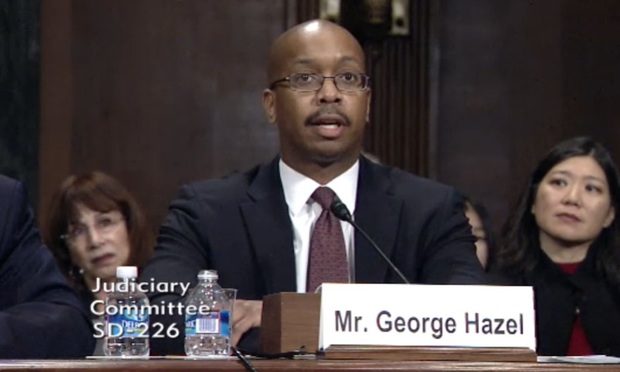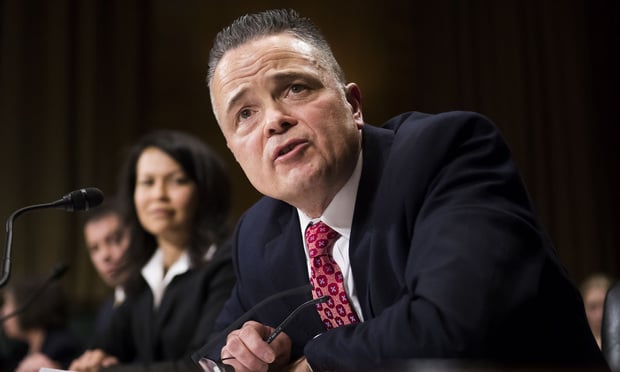DOJ Tells Maryland Judge Trump Hasn't Surrendered on Citizenship Question
A Maryland federal judge wanted to know the Trump administration's plans Friday. Government lawyers say they are still weighing their options to circumnavigate a US Supreme Court ruling that blocked the addition of a citizenship question.
July 05, 2019 at 02:21 PM
7 minute read
The original version of this story was published on National Law Journal
 US District Judge George Hazel, appearing in 2013 at his confirmation hearing. Credit: Senate Judiciary
US District Judge George Hazel, appearing in 2013 at his confirmation hearing. Credit: Senate Judiciary
Updated 3:47 p.m.
The U.S. Justice Department told a Maryland federal judge on Friday it is still exploring ways to add a citizenship question to the 2020 census, despite a U.S. Supreme Court ruling that declared the government's stated motivations as “contrived” and kept in place an injunction stopping agency officials from moving forward to amend the questionnaire.
Friday's filing came in response to a court-ordered 2 p.m. deadline that was set by U.S. District Judge George Hazel following an extraordinary emergency hearing earlier in the week. Hazel convened the hearing after seeing a tweet from President Trump that contradicted assurances from Justice Department lawyers that the administration would drop its plan to put a citizenship question on the 2020 census.
Hazel is one of three federal trial judges presiding over lawsuits challenging the proposed addition of a citizenship question, a move that the plaintiffs contend would discourage Hispanics and other non-citizens from responding and reduce the overall count of people living in the country. A divided Supreme Court last month upheld an injunction from a New York federal judge. In the Maryland case, Hazel said Friday the challengers will be allowed to explore new evidence against the Trump administration.
Trump said Friday that administration officials are considering several avenues—including an executive order—to attempt to circumnavigate the U.S. Supreme Court's decision. “We could start the printing now and maybe do an addendum after we get a positive decision. So we're working on a lot of things, including an executive order,” Trump told reporters. Any such move would almost assuredly face a new lawsuit, and another possibility of an injunction.
The Justice Department's court filing Friday said no final decision has been made on the next steps.
“In the event the Commerce Department adopts a new rationale for including the citizenship question on the 2020 Decennial Census consistent with the decisions of the Supreme Court, the government will immediately notify this court so that it can determine whether there is any need for further proceedings or relief,” Justice Department lawyer Joshua Gardner said in the new court filing.
On Wednesday, Jody Hunt, the head of the Justice Department's civil division, told Hazel that Main Justice had been “instructed” to consider avenues that would put a citizenship question on the 2020 census. Hunt told Hazel “there may be a legally available path under the Supreme Court's decision” and that “we're examining that.” Hunt did not say who directed the Justice Department to change its position.
 Jody Hunt testifies before the Senate Judiciary Committee during his confirmation hearing on March 7, 2018. Photo Credit: Diego M. Radzinschi/ALM
Jody Hunt testifies before the Senate Judiciary Committee during his confirmation hearing on March 7, 2018. Photo Credit: Diego M. Radzinschi/ALMThe 11th hour maneuvering comes after the June 30 deadline that Justice Department officials—including Noel Francisco, the U.S. solicitor general—said was necessary to start the process of printing the census questionnaire. Justice Department officials sought expedited review in the Supreme Court based on that deadline.
The divided Supreme Court, led by the vote of Chief Justice John Roberts Jr., kept in place an injunction blocking the Trump administration from putting a citizenship question on the next census. Roberts, joining liberal members of the court, called Trump's reasoning “contrived,” but the justices voted to give the administration another chance to argue for a new rationale. After the ruling, Trump complained privately about Roberts, according to a report in The Washington Post.
Challengers contend the Trump administration was lying when it said it needed to add the citizenship question to help enforce the Voting Rights Act. Evidence in the New York case that reached the Supreme Court showed U.S. Commerce Secretary Wilbur Ross pushed for the question as a top priority, and that the Justice Department, contrary to his statements, had not come to him with the idea.
Baker & Hostetler's David Rivkin and Gilson Gray of Duane Morris argued in a Wall Street Journal op-ed column on Thursday that the Trump administration could base any executive order on a provision of the 14th Amendment that was adopted to ensure the votes of newly freed slaves would be counted.
“That would trigger another round of litigation. Opponents would choose a federal district court likely to block it again, and the Justice Department would have to seek the Supreme Court's intervention during its summer recess,” Rivkin and Gray wrote. “While rare, such an emergency review has happened before. With the justification for the citizenship question being clear and compelling, the administration should prevail.”
Court records suggest the final deadline to add the citizenship question could be as late as October.
Fresh litigation, meanwhile, is unfolding in Hazel's Maryland courtroom after the emergence of new evidence purporting to back claims that Trump officials acted with discriminatory motivations—to harm Hispanics and benefit Republicans—when they proposed adding a citizenship question. That new evidence was derived from the computer files of a deceased Republican redistricting strategist who had communicated with Commerce officials.
A federal appeals court last month allowed the plaintiffs in the Maryland case to revisit their allegations that Trump administration officials acted with discriminatory motives. Hazel, who had earlier ruled that the claims did not include sufficient evidence, said recently he would move quickly to address the new evidence.
“Timing is an issue, and we've lost a week at this point. And this isn't anything against anybody on this call. I've been told different things, and it's becoming increasingly frustrating,” Hazel said at Wednesday's hearing.
Gardner, the Justice Department lawyer, told Hazel on Friday: “Proceeding to discovery now in connection with a new decision that has not yet been made would be premature. It would also be extremely inefficient.”
Lawyers from Covington & Burling and the Mexican American Legal Defense and Educational Fund represent plaintiffs in the Maryland suit. The plaintiffs in the New York case are represented by teams of lawyers from the American Civil Liberties Union, Arnold & Porter and the New York state attorney general's office.
The plaintiffs in the Maryland case said Friday that the Justice Department's “proposal to hold discovery in abeyance is particularly inappropriate given Defendants' repeated representations to this Court and other courts, including the United States Supreme Court, that timing is of the essence.”
Hazel rejected the Justice Department's move to pause the new proceedings in the Maryland litigation. The judge said in an order that “time is of the essence” and “discovery shall commence.” Hazel said he would permit up to five depositions of Commerce and/or Justice department officials.
The new fact-finding, the judge said in a scheduling order, will run until Aug. 19.
Read the transcript of Wednesday's hearing in Maryland:
[falcon-embed src="embed_1"]
Read more:
Roberts, Ruling Against Trump, Faces New Round of Conservatives' Criticism
Justices, Blocking Citizenship Question on Census, Call Trump's Push 'Contrived'
US Appeals Court Says Census Plaintiffs Can Explore New Evidence
Census Plaintiffs Alert Supreme Court to 11th Hour New Evidence
Justices, Appearing Divided, Weigh Legality of Adding Census Citizenship Question
This content has been archived. It is available through our partners, LexisNexis® and Bloomberg Law.
To view this content, please continue to their sites.
Not a Lexis Subscriber?
Subscribe Now
Not a Bloomberg Law Subscriber?
Subscribe Now
NOT FOR REPRINT
© 2025 ALM Global, LLC, All Rights Reserved. Request academic re-use from www.copyright.com. All other uses, submit a request to [email protected]. For more information visit Asset & Logo Licensing.
You Might Like
View All
'Should I Sue?': Navigating the New APA Landscape With Latham's Phil Perry and Andrew Prins

Litigator of the Week: Akin's Pratik Shah Helps the Chamber Block the NLRB's 'Joint Employer' Rule

Litigators of the Week: Hogan Lovells Duo Protects a 'Speed Bump' for High-Frequency Traders
Trending Stories
- 1‘The Decision Will Help Others’: NJ Supreme Court Reverses Appellate Div. in OPRA Claim Over Body-Worn Camera Footage
- 2MoFo Associate Sees a Familiar Face During Her First Appellate Argument: Justice Breyer
- 3Antitrust in Trump 2.0: Expect Gap Filling from State Attorneys General
- 4People in the News—Jan. 22, 2025—Knox McLaughlin, Saxton & Stump
- 5How I Made Office Managing Partner: 'Be Open to Opportunities, Ready to Seize Them When They Arise,' Says Lara Shortz of Michelman & Robinson
Who Got The Work
J. Brugh Lower of Gibbons has entered an appearance for industrial equipment supplier Devco Corporation in a pending trademark infringement lawsuit. The suit, accusing the defendant of selling knock-off Graco products, was filed Dec. 18 in New Jersey District Court by Rivkin Radler on behalf of Graco Inc. and Graco Minnesota. The case, assigned to U.S. District Judge Zahid N. Quraishi, is 3:24-cv-11294, Graco Inc. et al v. Devco Corporation.
Who Got The Work
Rebecca Maller-Stein and Kent A. Yalowitz of Arnold & Porter Kaye Scholer have entered their appearances for Hanaco Venture Capital and its executives, Lior Prosor and David Frankel, in a pending securities lawsuit. The action, filed on Dec. 24 in New York Southern District Court by Zell, Aron & Co. on behalf of Goldeneye Advisors, accuses the defendants of negligently and fraudulently managing the plaintiff's $1 million investment. The case, assigned to U.S. District Judge Vernon S. Broderick, is 1:24-cv-09918, Goldeneye Advisors, LLC v. Hanaco Venture Capital, Ltd. et al.
Who Got The Work
Attorneys from A&O Shearman has stepped in as defense counsel for Toronto-Dominion Bank and other defendants in a pending securities class action. The suit, filed Dec. 11 in New York Southern District Court by Bleichmar Fonti & Auld, accuses the defendants of concealing the bank's 'pervasive' deficiencies in regards to its compliance with the Bank Secrecy Act and the quality of its anti-money laundering controls. The case, assigned to U.S. District Judge Arun Subramanian, is 1:24-cv-09445, Gonzalez v. The Toronto-Dominion Bank et al.
Who Got The Work
Crown Castle International, a Pennsylvania company providing shared communications infrastructure, has turned to Luke D. Wolf of Gordon Rees Scully Mansukhani to fend off a pending breach-of-contract lawsuit. The court action, filed Nov. 25 in Michigan Eastern District Court by Hooper Hathaway PC on behalf of The Town Residences LLC, accuses Crown Castle of failing to transfer approximately $30,000 in utility payments from T-Mobile in breach of a roof-top lease and assignment agreement. The case, assigned to U.S. District Judge Susan K. Declercq, is 2:24-cv-13131, The Town Residences LLC v. T-Mobile US, Inc. et al.
Who Got The Work
Wilfred P. Coronato and Daniel M. Schwartz of McCarter & English have stepped in as defense counsel to Electrolux Home Products Inc. in a pending product liability lawsuit. The court action, filed Nov. 26 in New York Eastern District Court by Poulos Lopiccolo PC and Nagel Rice LLP on behalf of David Stern, alleges that the defendant's refrigerators’ drawers and shelving repeatedly break and fall apart within months after purchase. The case, assigned to U.S. District Judge Joan M. Azrack, is 2:24-cv-08204, Stern v. Electrolux Home Products, Inc.
Featured Firms
Law Offices of Gary Martin Hays & Associates, P.C.
(470) 294-1674
Law Offices of Mark E. Salomone
(857) 444-6468
Smith & Hassler
(713) 739-1250







